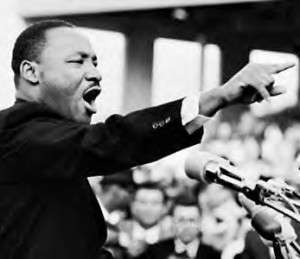This annual holiday in honor of America’s great nonviolent prophet, Dr. Martin Luther King Jr., is always a timely occasion to read the inspiring words of a minister who understood that his faith called for him to stand up for those traditionally frozen out of public decision-making and whose fair right to vote and equal opportunity were illusions.
Dr. King understood that change often flows from the civic tension that forces people to confront myths and half-truths and insincere calls for more time before change is made. Most of all, Dr. King teaches us still that it is important for people of good will to step forward to work for the benefit of people whose interests are often ignored.
While Dr. King’s words have deep meaning at any time, they have even more impact this year as the unified school board works to create a public education system that treats every child in our community equally and equitably. It will not be easy. Already, we have seen the clever justifications for separate town school districts that are often fueled by a racial prejudice not condemned by more sensible advocates of the concept.
Some of the language in the school debate have been ugly and the raw emotions on display in the Collierville hearing last week was a stark reminder of the tendencies by some to divide our community in “us and them” terms and to call for the sensitive treatment that was never shown to others as county school policies created racially identifiable schools in Southeast Shelby County and Arlington.
Shelby County has the opportunity to unite as a people behind the shared belief in quality education for all. The truth is that if the students in Collierville schools went to sleep one night and woke up the next day as part of a new unified school district, they would never know anything had changed. They would be in the same schools, they would have the same teachers, and they would remain part of the same socio-economic class that is the most significant determinant to classroom achievement.
We suddenly hear a lot of rhetoric about better results from smaller districts, but the silence was deafening on this concept when Shelby County Schools was in charge. It’s a safe bet that if there had never been a unified school board, we’d never have heard this sudden commitment to small districts. As we’ve said before, the ultimate irony is that if these suburban voters had approved consolidation, the two school districts would have been preserved and this issue would never have arisen.
Because of the undercurrent of race and class that bubbles beneath the surface of the school discussions, it’s the perfect time to reflect on Dr. King’s words.
Address to 1st Montgomery Improvement Association (MIA) Mass Meeting, at Holt Street Baptist Church:
And we are not wrong; we are not wrong in what we are doing. If we are wrong, the Supreme Court of this nation is wrong. If we are wrong, the Constitution of the United States is wrong. If we are wrong, God Almighty is wrong. If we are wrong, Jesus of Nazareth was merely a utopian dreamer that never came down to Earth. If we are wrong, justice is a lie (Yes), love has no meaning. And we are determined here in Montgomery to work and fight until justice runs down like water and righteousness like a mighty stream.
I want to say that in all of our actions, we must stick together. Unity is the great need of the hour and if we are united we can get many of the things that we not only desire but which we justly deserve. And don’t let anybody frighten you. We are not afraid of what we are doing because we are doing it within the law.
Letter from the Birmingham Jail:
You deplore the demonstrations taking place in Birmingham. But your statement, I am sorry to say, fails to express a similar concern for the conditions that brought about the demonstrations. I am sure that none of you would want to rest content with the superficial kind of social analysis that deals merely with effects and does not grapple with underlying causes. It is unfortunate that demonstrations are taking place in Birmingham, but it is even more unfortunate that the city’s white power structure left the Negro community with no alternative.
You may well ask: “Why direct action? Why sit ins, marches and so forth? Isn’t negotiation a better path?” You are quite right in calling for negotiation. Indeed, this is the very purpose of direct action. Nonviolent direct action seeks to create such a crisis and foster such a tension that a community which has constantly refused to negotiate is forced to confront the issue. It seeks so to dramatize the issue that it can no longer be ignored. My citing the creation of tension as part of the work of the nonviolent resister may sound rather shocking. But I must confess that I am not afraid of the word “tension.”
Just as Socrates felt that it was necessary to create a tension in the mind so that individuals could rise from the bondage of myths and half truths to the unfettered realm of creative analysis and objective appraisal, so must we see the need for nonviolent gadflies to create the kind of tension in society that will help men rise from the dark depths of prejudice and racism to the majestic heights of understanding and brotherhood…Too long has our beloved Southland been bogged down in a tragic effort to live in monologue rather than dialogue.
How does one determine whether a law is just or unjust? A just law is a man made code that squares with the moral law or the law of God. An unjust law is a code that is out of harmony with the moral law. To put it in the terms of St. Thomas Aquinas: An unjust law is a human law that is not rooted in eternal law and natural law. Any law that uplifts human personality is just. Any law that degrades human personality is unjust.
All segregation statutes are unjust because segregation distorts the soul and damages the personality. It gives the segregator a false sense of superiority and the segregated a false sense of inferiority. Segregation, to use the terminology of the Jewish philosopher Martin Buber, substitutes an “I it” relationship for an “I thou” relationship and ends up relegating persons to the status of things. Hence segregation is not only politically, economically and sociologically unsound, it is morally wrong and sinful. Paul Tillich has said that sin is separation. Is not segregation an existential expression of man’s tragic separation, his awful estrangement, his terrible sinfulness?
I had hoped that the white moderate would see this need. Perhaps I was too optimistic; perhaps I expected too much. I suppose I should have realized that few members of the oppressor race can understand the deep groans and passionate yearnings of the oppressed race, and still fewer have the vision to see that injustice must be rooted out by strong, persistent and determined action.




